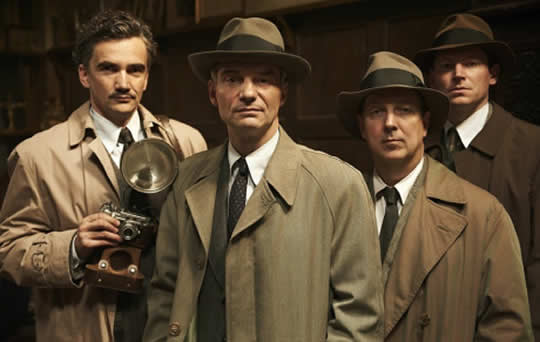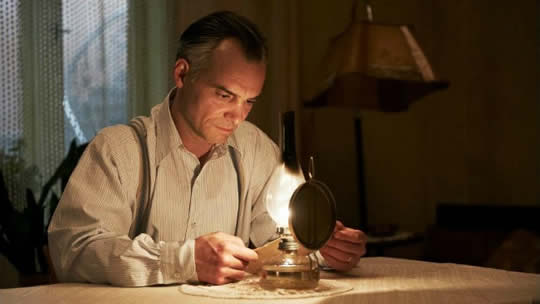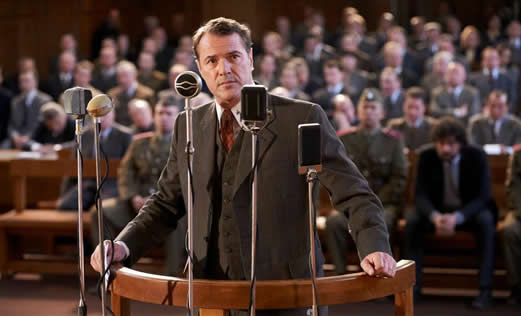 David Ondříček’s Noirish political thriller “In The Shadow” (Ve Stínu), the Czech 2012 Oscar submission, takes time to develop mood an character. I was reminded of Cold War Noirs like Wellman’s “The Iron Curtain”, Saville’s “Conspirator”, Hathaway’s “Diplomatic Courier” or Parrish’s “Assignment: Paris”.
David Ondříček’s Noirish political thriller “In The Shadow” (Ve Stínu), the Czech 2012 Oscar submission, takes time to develop mood an character. I was reminded of Cold War Noirs like Wellman’s “The Iron Curtain”, Saville’s “Conspirator”, Hathaway’s “Diplomatic Courier” or Parrish’s “Assignment: Paris”.
The crime thriller, set in Stalinist Czechoslovakia of 1953, pits a dogged policeman against the organized machinery of the state. The angst-ridden story is both specific to its time (the Jewish Show Trials in Prague that followed Stalin’s post-war purge of the Jews) and timeless in its study of a man willing to stand up against the system. Rumors of a currency devaluation run rampant but the government denies it. Dread of the unacknowledged coming crisis creates a queasy undertow. To distract the anxious population, Czech president Klement Gottwald’s regime, following Stalin’s Politburo lead, engineers their own “Jewish conspiracy”.
It’s a rainy night in Prague as shot by Poland’s master DP Adam Sikora (dubbed the “Prince of Darkness” ) Two thieves riffle a darkened jewelry shop. Captain Hakl (Ivan Trojan), head of the police detail who investigate the crime, suspects something larger is behind the “simple’ burglary. Clues seem to indict several Jewish Immigrants. State Security, who suddenly arrives on the scene, contend the burglars are a cell of US-backed Zionist terrorists and send in East German agent Zenke (Sebastian Koch).
Sweat found at the scene leads police suspicion to fall on Jakata, a crude safe-cracker, who “sweats like a pig.” Haki’s private discovery of a pouch encourages his doubt. Zenke links main suspect Jewish fall-guy Kirsch (Miroslav Krobot) to the crime scene. Zenke’s involvement heightens Hakl’s suspicions, especially when Haki discovers Zenke’s SS background.
Back at his office, Haki’s shocked to find that his boss Colonel Panek (Jirí Stepnicka) allowed State Security to  search his desk. Panek, who’s protecting his impending promotion, explains that Zenke’s been on the case for three years. “This is not some lock picker, it’s politics.”
search his desk. Panek, who’s protecting his impending promotion, explains that Zenke’s been on the case for three years. “This is not some lock picker, it’s politics.”
Although newspapers headline’s already claim Zionist jews are behind the robbery, Haki knows better. Kirsch was in a drunken tank at the time. “Who else knows this” grills worried Panek. “I do.” Haki needs to interrogate the suspects, but they are sequestered by State Security. State Security uses severe “standard” interrogations to elicit a confession. One suspect indicts other “conspirators” and Zenke’s ordered to arrest the staff of the Jewish Community Center.
In his own way Zenke is as resistant as Haki, reminding the inquisitors that Kirsch’s testimony is useless. “What will I arrest them for, employing a drunk?” he asks. At home, work obsessed Haki sleeps in an armchair, avoiding his wife Jitka (Sona Norisová ) who must turn to his partner Bares (Marek Taclík) to know anything about Haki’s work.
He’s better at quality time with young son Tom (Filip Antonio). Finding time to read him Verne’s “20,000 Leagues under the Sea” they thrill at the Giant Squid who no man can best.
Anxious Jitka suggests converting their savings to stamps, which hold their value. A romantic move between the edgy couple is interrupted when Jitka sees a man peering through the window. Haki’s eager informant leads him to Janat’s whore. Griliing the reluctant old doxie, she admits that ‘They came for him.”
Old partners can’t be trusted and witnesses keep disappearing. Jakata’s body turns up with a planted machine gun, linked to the robbery. Haki’s “colleague” Beno moves Zenke into Haki’s building. Zenke practices the piano, intriguing Jitka, who notices Haki’s unease around the solitary man. In the laundry, lonely Jitka offers to help Zenke fold his laundry. The sexual tension is thick. He stands close behind her as she folds, as if remembering another woman in another place and time, but the steamy moment is interrupted. Little ambiguous observations like this, peppering the film, add character to the thriller.
Staff from the Jewish Community Center is arrested at a check point, attempting to deliver donations of clothes to the Vienna diaspora. Money planted in the car gives the State Security their “suspects” and they sweep up all the workers at the center. Another suspicious crime scene leaves three dead. Unknown safe crackers shoot a Postal Worker and two others. The burglar shoots all witnesses and tries to dig a bullet out of one of the victim’s chest. Haki arrives at the scene before State Security, and recovers a bullet, smuggling it out, he convinces Police ballistics expert Vita (Krystof Mucha) to run an ID.
Another suspicious crime scene leaves three dead. Unknown safe crackers shoot a Postal Worker and two others. The burglar shoots all witnesses and tries to dig a bullet out of a victim’s chest. Haki arrives at the scene before State Security, and recovers a bullet, smuggling it out, he convinces Police ballistics expert Vita (Krystof Mucha) to run an ID. Zenke tells his Soviet minders that he’s completed his mission, but they expect him to testify at the trial. “I was asked to prepare materials for prosecution.” ” We will decide when your mission is over,” they threaten.
 Vita confirms the bullet came from the Russian model gun carried by State Security officers and promises to ID the owner. ”Do you know what this is? he warns Haki. ‘I’ve forgotten and you should too.”
Vita confirms the bullet came from the Russian model gun carried by State Security officers and promises to ID the owner. ”Do you know what this is? he warns Haki. ‘I’ve forgotten and you should too.”
Jitka gives Haki their savings to invest in a valuable painting, Worried, she tells him that Zenke is a decent man. At Planek’s party, Haki meets senior Colonel Plukovnik Morozov (Sergej Raiter) fresh from Moscow and confronts Zenke about Kirsch. ” He’s confessed,” says Zenke. “He didn’t do it and you know it. Five Jews or five million it doesn’t matter to you” answers the disgusted cop.
“You have a fine family, you better take care of them” warns Zenke,” Sometimes things are not the way they look.” Their talk erupts into a brawl.
Stitched up at the ER, Haki sleeps it off at Beno’s house, and discovers Beno’s State Security ID. The noose is tightening. Vita drops off evidence with Jitka. Observing, Zenke trails Jitka and Tom to the shopping street where the Moscow planted anti-Semitism is running high: a jew sits on a stool In a shop window wearing an anti-Zionist sign. Jitka is mugged and hospitalized. Haki can’t even investigate the mugging, State Security officers are already on the scene.
Realizing the stakes, Haki gives his partner Bares the envelope of money (to buy the painting) and circles his wagons. Father and son make do while Mom is in the hospital. Their scenes together are the most emotional in the film. Haki works on the electricity during a blackout. Canny Tom ask why “they keep turning off the electricity?” “I guess they want us to be afraid.” admits father. “I’m not afraid of anything, just like you” reassures Tom then asks his father about his stitches. “I got in a fight.” “You won’t let me fight. ” Well, now I will, but you have to know what you’re fighting for.” He gives him some moves but warns him to keep it a secret from mom. It’s clear that Haki is fighting for Tom’s future, his own may be moot by now.
Vita’s been replaced. Realizing why his wife was mugged Haki finds the evidence in her bag. Haki packs up Tom to send him to Grandma’s house. “Are you going to fight again?” “Remember the Giant squid that no one can defeat? I have to fight a monster like that…even though it can’t be killed, it will weaken and someone will kill it. ” ‘Who?” asks Tom. “Someone.”
The slow building political Noir achieves a complex final act. Jan Vlasák’s suitably drab production design (filled with liitle touches like the weighted turntable at the VIP party, Michal Lánsky deft edit and Jan P. Muchow and Michal Novinski’s spare uneasy score complements the sense of foreboding. Trojan makes much of his cynical heroism. The part is perhaps underwritten, but there are shades of Alec Guinesse’s world weary Smiley in Trojan’s nuanced performance. He’s well matched by Sona Norisova’s portrayal of his loyal wife Jitka.
Like the Smiley films, “In The Shadow” is a moody character study, rather than a plotty action thriller. As rapid political changes swirl around Hakl, he comes into his own as a father concerned for his son’s future, willing to risk everything to do the right thing, knowing the final price he will pay. Haki need to leave his son a legacy and an example- a fearless man not an amoral operative of the State. Fatherhood also creates a bond with the ambiguous Zenke, who’s manipulative acts are driven by fear for his own family. He’s spent eight years in Siberia and only seen his daughter in pictures. The former SS Officer imprisoned, then enlisted by the Politburo, is also a man in a tight corner.
Zenke’s on the brink of leaving. His passport’s been approved and he will cross the border after the show trial broadcast. Haki brings Zenke the evidence and urges him to testify and save the Jews. “No one can save them” explains Zenke, warning him to save himself. “There is no Justice. Think about Tom, his future.” “What good’s a father who’s afraid? Says Haki. ” What good’s a father who’s dead,” says Zenke but it falls on deaf ears.
Zenke, ordered to betray the innocent Jews at the show trial or never see his family again, does. Crossing over the border to the West he carries a time bomb-Haki’s evidence that will prove their innocence. Haki is on the warpath. His inevitable death is handled in the most minimalist way. In a coda, fatherless Tom faces off two bullies. His look into the camera carries Haki’s determination. The torch has been passed.

